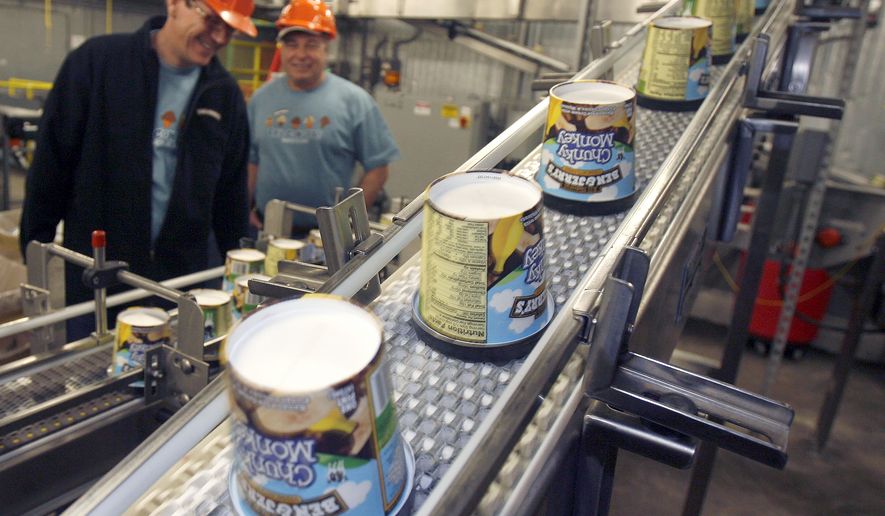Ben & Jerry’s announced Monday it would stop selling its ice cream in the West Bank settlements, handing a significant victory to the anti-Israel boycott movement and spurring scathing condemnations from Israeli officials.
In its statement, Ben & Jerry’s said it would not renew its licensing agreement with its licensee in the region, but that the company would “stay in Israel through a different arrangement” to be announced later.
“We believe it is inconsistent with our values for Ben & Jerry’s ice cream to be sold in the Occupied Palestinian Territory (OPT),” said the company in a statement. “We also hear and recognize the concerns shared with us by our fans and trusted partners.”
Leading the backlash was Israeli Prime Minister Natftali Bennett, who said the Vermont-based company known for its progressive activism has branded itself “the anti-Israel ice cream.
“There are many ice cream brands, but only one Jewish state,” said Mr. Bennett in a statement. “Ben & Jerry’s has decided to brand itself as the anti-Israel ice cream. This decision is morally wrong and I believe that it will become clear that it is also commercially wrong.”
He added that the “boycott against Israel — a democracy surrounded by islands of terrorism — reflects a total loss of way. The boycott does not work and will not work, and we will fight it with full force.”
Cheering the move was the Palestinian BDS [Boycott, Divestment and Sanctions] National Committee, which said it “welcomes Ben & Jerry’s decision as a decisive step towards ending its complicity in Israel’s occupation and violations of Palestinian rights.”
At the same time, the group called on Ben & Jerry’s to “end all operations in apartheid Israel.
“Ben & Jerry’s, a leading socially responsible international company, is finally bringing its policy on Israel’s regime of oppression against Palestinians in line with its progressive positions on Black Lives Matter and other justice struggles,” said the BDS group on Twitter.
The Council on American-Islamic Relations said it welcomed the decision “to stop doing business in what is internationally recognized as illegally-occupied territory.
“American corporations should not support Israeli violations of human rights and the breaking of international law,” said CAIR national spokesperson Ibrahim Hooper.
At the other end of the political spectrum, the American Israel Public Affairs Committee, or AIPAC, called it “discriminatory and against the interests of peace and reconciliation to launch a one-sided boycott when it is the Palestinian leadership that refuses to come to the negotiating table with Israel.”
Israeli Foreign Minister Yair Lapid ripped the decision as “a disgraceful capitulation to antisemitism, to BDS [the Boycott, Divestment and Sanctions movement against Israel], to all that is evil in the anti-Israeli and anti-Jewish discourse,” drawing a rebuke from the progressive Jewish advocacy group J Street.
J Street president Jeremy Ben-Ami said the decision “isn’t antisemitism,” pointing out that the two founders of Ben & Jerry’s are both Jewish.
“The battle against real antisemitism would actually be helped a great deal if the Israeli government and American Jewish communal leaders would stop using the term against those who draw a principled and rational distinction between commercial transactions in the State of Israel and those in the territory it occupies,” he said.
Now we Israelis know which ice cream NOT to buy 🇮🇱💪 https://t.co/j7VNpIWX0f
— Benjamin Netanyahu (@netanyahu) July 19, 2021
Mr. Lapid noted that more than 30 U.S. states have passed anti-BDS legislation in recent years, and that he would ask “each of them to enforce these laws against Ben & Jerry’s.
“I plan on asking each of them to enforce these laws against Ben & Jerry’s. They will not treat the State of Israel like this without a response,” he said.
AIPAC tweeted that the BDS leadership “speaks openly about their desire to destroy the Jewish state. BDS seeks to achieve its objective by demonizing Israel and its people, and by encouraging economic and cultural boycotts of Israel.”
Ben & Jerry’s said the current licensing agreement expires at the end of the year.
The ice-cream maker is known for its progressive activism, such as its launch last year of “Change the Whirled,” a vegan flavor featuring Colin Kaepernick on the container, with a portion of the sales going to the former NFL quarterback’s Know Your Rights camps.
• Valerie Richardson can be reached at vrichardson@washingtontimes.com.




Please read our comment policy before commenting.